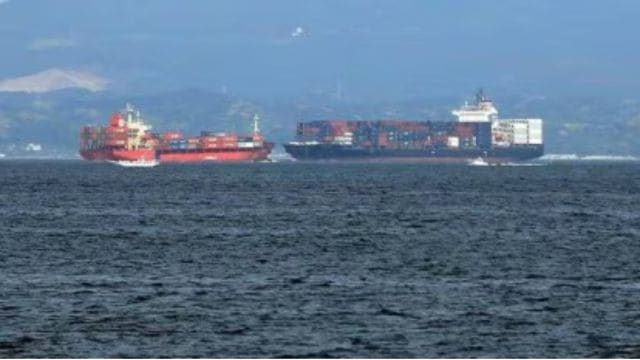India hits back after Yunus Northeast remark, halts transshipment facility for Dhaka
During his four-day visit to China, from March 26-29, the Chief Adviser of Bangladesh's interim government, Professor Muhammad Yunus, had remarked that, with Northeast India being “landlocked”, Dhaka was the “only guardian of the ocean for all this region”.
 The 2020 circular had permitted the transhipment of export cargo from Bangladesh to third countries using Indian Land Customs Stations en route to Indian ports and airport. (File)
The 2020 circular had permitted the transhipment of export cargo from Bangladesh to third countries using Indian Land Customs Stations en route to Indian ports and airport. (File)Days after Bangladesh Chief Adviser Muhammad Yunus advocated the extension of the Chinese economy around the strategically important Northeast India region, New Delhi has terminated the transshipment facility for Bangladesh’s export cargo — a move that could potentially disrupt Bangladesh’s trade with several countries.
The decision was announced late Tuesday through a notification issued by the Central Board of Indirect Taxes and Customs (CBIC).
The Ministry of External Affairs (MEA) said that the transshipment facility extended to Bangladesh had over a period of time resulted in significant congestion at our airports and ports. “Logistical delays and higher costs were hindering our own exports and creating backlogs. The facility, therefore, has been withdrawn w.e.f. April 8, 2025. To clarify, these measures do not impact Bangladesh exports to Nepal or Bhutan transiting through Indian territory,” MEA spokesperson Randhir Jaiswal said.
Apparel Export Promotion Council (AEPC) secretary general Mithileshwar Thakur said the measure was the result of “long standing demand” of Indian exporters for stopping transshipment of Bangladeshi cargo, meant for shipments to third countries, through Indian ports. This will help in rationalisation of freight rates resulting in less transportation cost to the Indian exporters besides decongesting the airports, Thakur said.
During his March 26-29 visit to China, Yunus had said that with Northeast India being “landlocked”, Dhaka was the “only guardian of the ocean for all this region”. This statement was widely interpreted as an attempt by Dhaka to assert its leverage over access to Northeast India — a matter of concern for Delhi. Yunus’s efforts to portray Beijing as a new strategic partner further complicated the already fragile India-Bangladesh relationship.
“The seven states of eastern India, known as the Seven Sisters, are a landlocked region. They have no direct access to the ocean,” Yunus had said. “We are the only guardian of the ocean for this entire region. This opens up a huge opportunity. It could become an extension of the Chinese economy — build things, produce things, market things, bring goods to China and export them to the rest of the world.”
The CBIC, in its notification, stated that the government had rescinded the circular dated June 29 in respect of the “transhipment of export cargo from Bangladesh to third countries through Land Customs Stations (LCSs) to ports or airports in containers or closed-bodied trucks”.
Think tank GTRI explained that the 2020 circular had permitted the transhipment of export cargo from Bangladesh to third countries using Indian Land Customs Stations en route to Indian ports and airports, thereby enabling smooth trade flows for Bangladesh’s exports to other countries.
“With the new circular, this transhipment arrangement has been terminated with immediate effect. However, cargo that has already entered Indian territory under the earlier system will be allowed to exit as per existing procedures,” the notification said.
Former trade officer and Head of the Global Trade Research Initiative (GTRI), Ajay Srivastava, said India had consistently supported Bangladesh’s interests and had provided one-way, zero-tariff access to Bangladeshi goods (with the exception of alcohol and cigarettes) to the vast Indian market for the past two decades.
“However, Bangladesh’s plans to establish a strategic base near the Chicken’s Neck area with China’s assistance may have prompted this action. Bangladesh has invited Chinese investment to revitalise the airbase at Lalmonirhat, near India’s Siliguri Corridor,” Srivastava said.
Reacting to Yunus’s remarks, Assam Chief Minister Himanta Biswa Sarma had termed them “offensive” and “strongly condemnable”. In a post on X, Sarma said Yunus’s statement underscored the “persistent vulnerability narrative associated with India’s strategic ‘Chicken Neck’ corridor”. He argued for developing better transport networks connecting the region with the rest of India, including the development of alternative road routes bypassing the corridor.
The Northeastern states of Assam, Arunachal Pradesh, Manipur, Meghalaya, Nagaland, Mizoram, Tripura and Sikkim collectively have a 1,596 km long international border with Bangladesh, 1,395 km with China, 1,640 km with Myanmar, 455 km with Bhutan and 97 km with Nepal, but are connected with the rest of India only through a 22-km strip of land called the “Chicken Neck” corridor.
Srivastava, however, said the government’s latest decision could raise questions regarding India’s commitments under World Trade Organization (WTO) provisions, which mandate freedom of transit for goods to and from landlocked countries.
“According to WTO rules, particularly Article V of the General Agreement on Tariffs and Trade (GATT) 1994, all WTO members are required to allow freedom of transit for goods moving to and from landlocked countries. This means such transit must be unrestricted, free from unnecessary delays, and not subject to transit duties,” Srivastava said.
Further support comes from the WTO Trade Facilitation Agreement (TFA), Article 11, which strengthens and modernises the transit provisions under GATT. It calls for transparent procedures, reduced inspections, and regional cooperation, while promoting practical solutions such as guarantees or bonds to ease cross-border trade.
Must Read
Buzzing Now



Apr 27: Latest News
- 01
- 02
- 03
- 04
- 05























